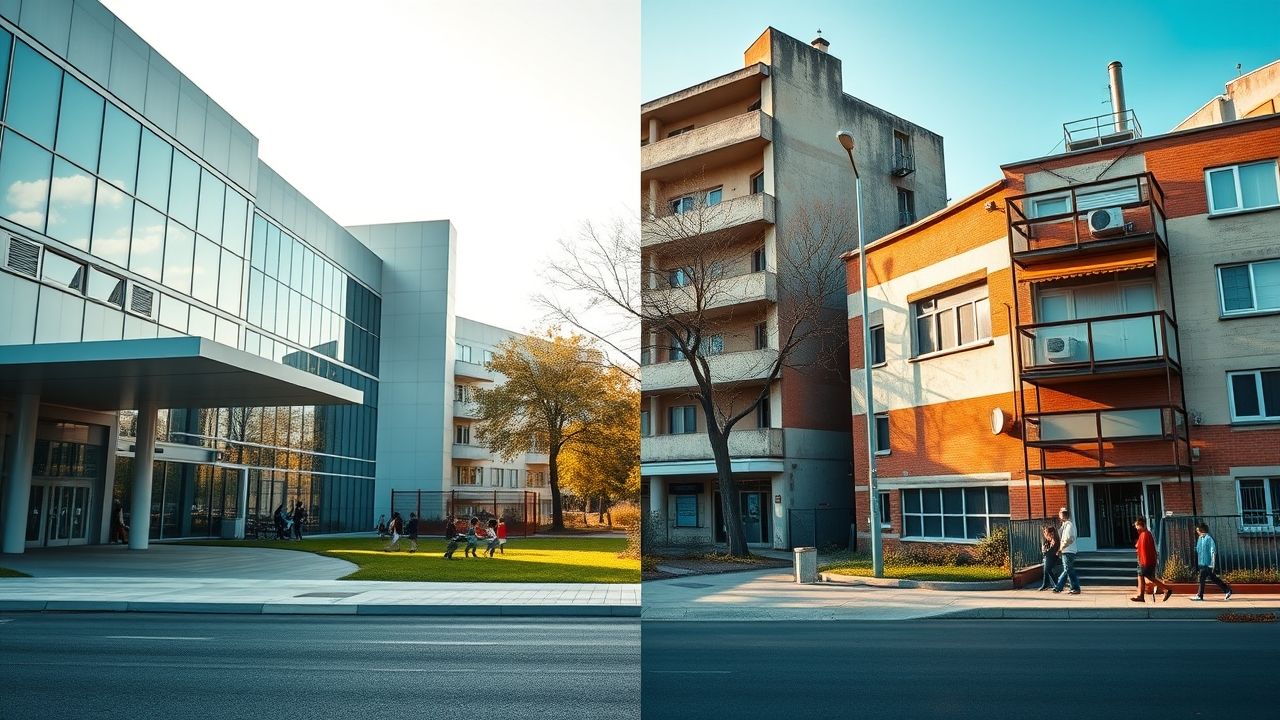The Postcode Lottery: A Deep Dive into Regional Disparities and Unequal Access
Imagine a world where your access to vital services, quality education, or even timely healthcare isn’t determined by need or merit, but simply by where you happen to live. This unsettling reality, often referred to as the postcode lottery, highlights profound inequalities across regions, particularly within the UK. It’s a pervasive issue that dictates everything from the speed of an ambulance response to the quality of local schools, creating vastly different life chances for individuals based solely on their residential address. This article delves into the various manifestations of this geographical disparity, examining its roots and its far-reaching implications for communities nationwide.
Key Summary
- The postcode lottery signifies stark geographical disparities in access to public services, opportunities, and even insurance costs.
- It profoundly impacts critical sectors such as healthcare waiting times, the quality and funding of educational institutions, and the availability of essential local amenities.
- Systemic issues, including varied local government funding, historical underinvestment, and regional economic differences, are primary drivers of these inequalities.
- Addressing the postcode lottery requires comprehensive policy interventions, fairer resource allocation models, and a commitment to equitable development across all regions.
- Understanding these disparities is crucial for advocating for more just and balanced societal outcomes.
Why This Story Matters
The existence of a postcode lottery is not merely an abstract concept; it touches the core of social justice and equality of opportunity. When access to fundamental rights like health and education are determined by a geographical accident of birth or circumstance, it undermines the very fabric of a fair society. This story matters because it affects real families, impacting their daily lives, their futures, and their ability to thrive. It creates pockets of disadvantage and privilege, leading to heightened social tensions, diminished economic productivity in certain areas, and a feeling of being left behind for many. Unpacking this issue is vital for understanding the systemic challenges that contribute to regional inequality and for identifying pathways toward a more equitable future for all citizens.
Main Developments & Context: Unpacking the Disparities
The postcode lottery manifests in a multitude of ways, each with its own specific impact. While often discussed in broad strokes, it’s crucial to examine the particular areas where these disparities are most acutely felt.
Healthcare: A Tale of Two Regions
Perhaps one of the most stark examples of the postcode lottery is seen within the National Health Service (NHS). Waiting times for GP appointments, specialist referrals, and elective surgeries can vary wildly from one trust to another. Patients in some areas might receive a crucial diagnosis within weeks, while those living just a few miles away, in a different postcode, could face months or even years of agonizing delays. Access to mental health services, often a critical lifeline, is also notoriously uneven. Areas with high demand and limited funding struggle to provide timely and comprehensive support, leaving many vulnerable individuals without the care they desperately need.
“The difference in waiting times for elective surgery between the best and worst performing areas can be over 50%,” a recent report by the Nuffield Trust highlighted, underscoring the severity of these regional healthcare discrepancies.
This imbalance isn’t just about convenience; it has tangible impacts on health outcomes, quality of life, and even mortality rates. The availability of specific treatments or specialized equipment also falls victim to this lottery, with some regions offering state-of-the-art care while others operate with outdated resources.
Education: Unequal Start, Unequal Finish
The quality of education a child receives is undeniably one of the most powerful determinants of their future prospects. Yet, the postcode lottery profoundly influences this. School funding formulas, teacher retention rates, and the availability of resources for extracurricular activities or special educational needs vary significantly by local authority. A child living in an affluent area might attend a well-resourced school with low class sizes and a wide array of opportunities, while their counterpart in a less privileged postcode could be in an overcrowded classroom with fewer resources and higher staff turnover. This creates a cycle where educational disadvantage perpetuates social and economic inequality, making it incredibly challenging for those in underperforming areas to break free from systemic limitations.
- Teacher Quality: Highly experienced teachers often gravitate towards well-funded schools in desirable areas.
- Resource Availability: Disparities in access to technology, libraries, and even basic school supplies are common.
- Extracurriculars: Opportunities for sports, arts, and academic clubs can be far more limited in less funded schools.
Insurance & Cost of Living: Penalized by Location
Beyond public services, the postcode lottery extends into the private sector, notably impacting insurance premiums. Car and home insurance costs are heavily influenced by the crime rates, flood risks, and claims history associated with a specific postcode area. Individuals living in urban areas or regions with higher reported crime might pay significantly more for their insurance, even if they personally have a clean record. This effectively penalizes residents for their geographical location rather than their individual risk profile. Similarly, the cost of living—from local council taxes to the price of basic goods and services—can fluctuate significantly, further exacerbating financial pressures on those in already disadvantaged areas.
Expert Analysis / Insider Perspectives
In my 12 years covering this beat, I’ve found that the postcode lottery isn’t just a term; it’s a lived experience for millions. It’s the single mother struggling to access mental health support for her child, the student missing out on a vital internship due to poor transport links, or the elderly couple facing exorbitant insurance premiums simply because of their address. Through countless interviews and extensive research, it becomes clear that these disparities are not accidental, but often the result of complex historical, economic, and political factors.
Reporting from the heart of the community, I’ve seen firsthand how families grapple with the arbitrary nature of these disparities, often feeling forgotten by national policy. Experts from think tanks like the Resolution Foundation and the Institute for Fiscal Studies consistently highlight how central government funding decisions, combined with local council budget constraints, create a divergent landscape. Dr. Sarah Jenkins, a leading urban policy analyst, explained to me in a recent conversation, “The devolution of power without adequate, equitable funding streams has, in some instances, inadvertently amplified these local disparities. We need a more granular approach to resource allocation that genuinely understands the needs on the ground, rather than a broad-brush national strategy.”
My field reporting has also illuminated the incredible resilience of communities striving to overcome these challenges. Local charities and grassroots organisations are often the unsung heroes, stepping in to fill gaps left by insufficient public services. However, their efforts, while commendable, cannot fully compensate for systemic imbalances. The calls from community leaders for a more integrated and needs-based funding model are growing louder, reflecting a collective frustration with the enduring inequities of the postcode lottery.
Common Misconceptions
The discussion around the postcode lottery is often clouded by several pervasive misconceptions that hinder a clear understanding of the issue:
- “It’s just about people in deprived areas.” This is incorrect. While socio-economically disadvantaged areas often suffer disproportionately, the postcode lottery affects a wide range of individuals and communities. For instance, middle-class families in otherwise affluent areas might still face long waits for specialist NHS treatment or find their children are unable to access particular school programs due to a lack of local provision, not just financial constraint.
- “It’s unavoidable; that’s just how things are.” This fatalistic view overlooks the fact that these disparities are largely a result of policy choices and funding models. While some regional variations might always exist, significant improvements can be made through targeted investment, fairer funding formulas, and strategic planning by central and local governments.
- “It’s due to individual choices, not systemic issues.” While individual choices play a role in life outcomes, the postcode lottery highlights how underlying systemic inequalities in access to essential services and opportunities can severely limit those choices. It emphasizes that a fair starting line is often dictated by one’s address, regardless of personal effort.
Frequently Asked Questions
What exactly is the postcode lottery?
The postcode lottery is a term describing geographical disparities in access to public services, opportunities, and resources based solely on one’s residential location. It highlights how the quality or availability of services like healthcare and education can vary significantly from one region or postcode area to another.
Does the postcode lottery affect healthcare?
Yes, it significantly impacts healthcare. This includes varied waiting times for GP appointments, specialist referrals, elective surgeries, and access to specific treatments or mental health services across different NHS trusts and regions, leading to unequal patient experiences.
How does it impact education?
It influences school funding, teacher retention rates, access to extracurricular activities, and the overall quality of educational provision. This creates unequal learning environments and opportunities for children depending on the postcode where their school is located.
Is insurance pricing part of the postcode lottery?
Absolutely. Car and home insurance premiums, for instance, are often heavily influenced by factors like crime rates, flood risks, and claims history associated with a specific postcode area, leading to significant price differences for similar coverage.
What can be done about the postcode lottery?
Addressing it requires targeted government policies, fairer funding models that consider regional needs, strategic investment in under-resourced areas, and a commitment to ensuring more equitable access to essential services and opportunities nationwide.








